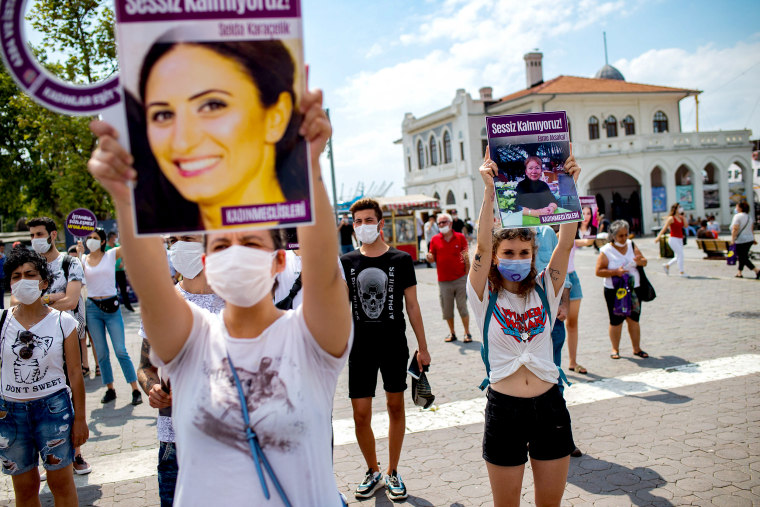ISTANBUL — I met Gizem through a women’s rights organization on Aug. 10. Too scared to use her real name, she told me that she spent a year and a half terrified of her violent estranged husband, hoping he would stop threatening her and her family once their divorce was finalized. Her fear is not misplaced. The number of women killed by current or former partners appears to be on the rise in Turkey — with the Turkish government poised to undermine one of the strongest safeguards protecting women from intimate partner violence.
Her fear is not misplaced. The number of women killed by current or former partners is on the rise in Turkey.
Thanks in large part to Turkey’s participation in a European domestic violence treaty known as the Istanbul Convention, Gizem now feels protected from her ex-husband. But others have not been so lucky, as evidenced by the high-profile murder of student Pınar Gültekin in July. That brutal killing sparked a spasm of protest across the country.
Advocacy groups that monitor violence against women say the problem is only getting worse. We Will Stop Femicide, an advocacy organization that tracks domestic, gender-based violence against women — often known as femicide — suggests a steady increase of killings in the last decade. According to their data, over 2,000 women were killed from 2008 to 2017. Although the government avoids commenting on the increase in femicides, a recent report by Turkish law enforcement asserts similar numbers, concluding that close to 2,500 women were killed in those same years. Both datasets show a downward spike in only one year, 2011, the year Turkey signed and promoted the Istanbul Convention.
But even as feminists are calling for the full execution of the convention, Turkey’s government is thinking about leaving it. President Recep Tayyip Erdogan’s ruling party, AKP, met on Aug. 13 to decide whether Turkey should pull out of the international accord.
The government’s lack of enthusiasm has a lot to do with a disinformation campaign pushed by religious and far-right columnists in recent years. This campaign has tried to repaint the convention as a tool of Western powers designed to destroy the family unit and attempted to tie the convention’s protection of gender to LGBTQ advocacy.
Such sentiments parallel Erdogan’s strong nationalist and religious stance as he works to consolidate his Islamist-rooted party’s base. According to some opinion polls, his support is slipping, even as he continues to crack down on the opposition.
Such sentiments parallel Erdogan’s strong nationalist and religious stance as he works to consolidate his Islamist-rooted party’s base.
An Islamist lobbying group, Turkey Thinking Platform, submitted a detailed report to Erdogan in May arguing Turkey should pull out of the convention. (The group has since backed away from its criticism.) Even so, emboldened by Erdogan’s recent move to desacralize Hagia Sophia and designate the historical monument a mosque again, Islamist groups are doubling down on a conservative agenda, going as far as calling for the establishment of an Islamic caliphate.
It wasn’t always this way. Turkey was, not too long ago, a strong supporter of the Istanbul Convention — hence its name. When Erdogan gained power in 2002, AKP followed a pro-Western political agenda. Erdogan’s stable and balanced policies transformed Turkish society, and the economy began to thrive. Remember, Erdogan’s AKP was once labeled the “Muslim Democrats” for combining a conservative religious identity with liberal values.
Although Erdogan was already hinting at a shift toward more authoritarian and illiberal policies in 2012, a crucial turning point was the environmental protests, known as the Gezi Park protests, that spread to most of the country in 2013. Following these protests, Erdogan decided to consolidate power within his majority, deeply polarizing society and undermining his relations with Western allies. A failed coup attempt in 2016 lead to a two-year-long state of emergency, with thousands purged from public service, more than a hundred media outlets shut down. Hundreds of journalists lost their jobs and some ended up in jail for their journalistic activities.
As of today, dissidents are still censored, repressed and arrested. After a referendum in 2017, Turkey transformed from a decades-long parliamentary system into a heavily centralized presidential system, meaning Erdogan has even more power over things like, for example, participation in the Istanbul Convention.
All of which makes Turkey’s women’s rights movement more impressive. Turkey was the only Muslim country to adopt the secular Swiss Civil Code with minor changes in 1926, during the ruling of Mustafa Kemal Atatürk, the founder of the modern nation. Many waves and factions of feminism have flourished over the years, but today these groups have mostly united in response to misogynist comments from politicians who warn women not to laugh in public, call women who reject motherhood “incomplete” and “deficient,” claim women are not equal to men by nature, and describe birth control as “treason.”
Increasing femicides and domestic violence has contributed to women’s widespread mobilization. But more importantly, with the transformation of the society, women have become more visible in work and social life and more confident in their public appearances. And of course, this has led to a male backlash.
In response to viral campaigns like the #challengeaccepted social media campaign, Islamist groups continue to portray feminists as enemies of the state. A prominent Islamist columnist, Abdurrahman Dilipak, wrote an article calling the women in AKP “prostitutes” for supporting the Istanbul Convention.
All of which is to say, victims of domestic violence are right to be worried about the future of women’s rights in Turkey. As Gizem told me, she cannot imagine what her life would be like without these international safeguards. And clearly, Turkey’s leaders cannot be trusted to protect its women on their own.

